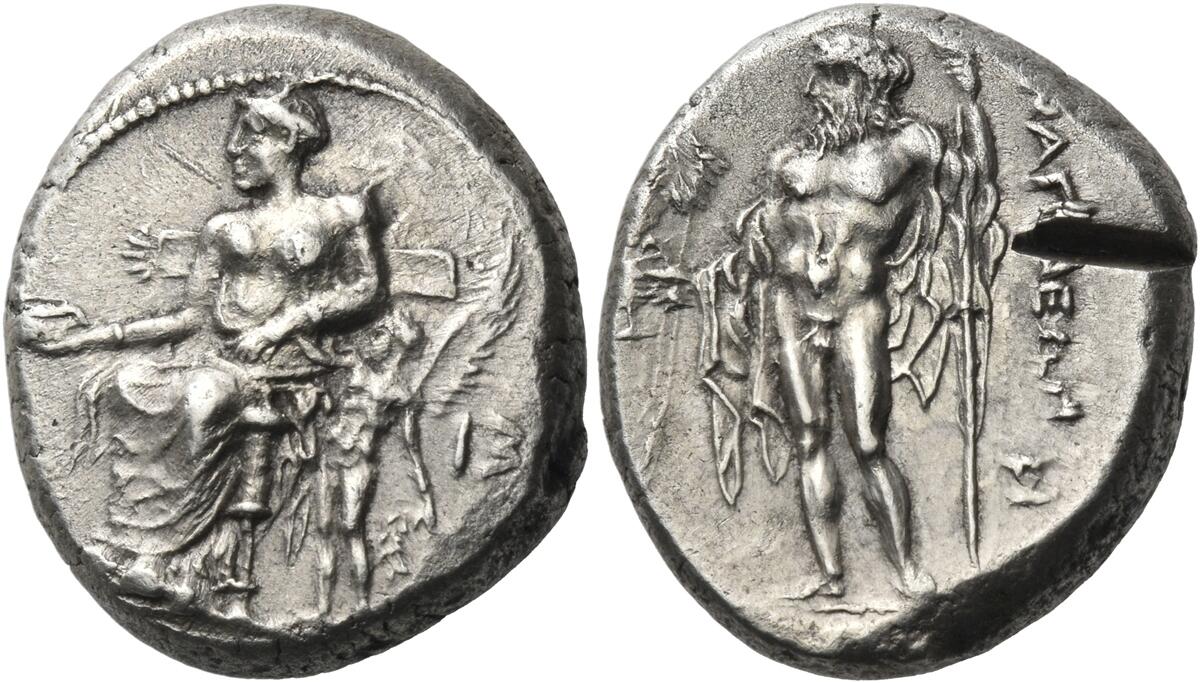AC 271 - Nagidus, silver, stater, 420-333 BC
From SILVER
420 BCE - 333 BCE Silver 6,226 kg
Description
| ObverseInscription or printing placed on the obverse.: | ΣΙ (Greek).Aphrodite, draped to the waist, seated to left, on a throne with a broad top rail that ends in a palmette at each side, holding a phiale in her right hand, with a bracelet around her right and left forearms, and resting her left hand in her lap, behind her to right, Eros standing facing, his head turned to left, clasping Aphrodites left arm with his right hand and holding a wreath in his lowered left, in the lower right field, behind Eros, ΣΙ (retrograde). |
| ReverseInscription or printing placed on the reverse.: | NAΓIΔEΩN (Greek).Dionysos, bearded and nude but for drapery over his shoulders, standing facing, his head to left, holding a kantharos in his right hand and a thyrsos with his left, above the kantharos to left, grape vine, in the lower right field, monogram. |
Mint and issuing power
| MintIdentifies the place of manufacture or issue of a numismatic object.: | Nagidus | Ancient regionAncient region.: | Cilicia | Modern countryModern country: Turkey | AuthorityIdentifies the issuing power. The authority can be "pretended" when the name or the portrait of X is on the coin but he/she was not the issuing power. It can also be "uncertain" when there is no mention of X on the coin but he/she was the issuing power according to the historical sources: | Persian Empire |
Chronology
| FromIdentifies the initial date in a range assigned in a numismatic context. | 420 BCE | toIdentifies the final date in a range assigned in a numismatic context.. | 333 BCE | PeriodTime period of the numismatic object.: Classical 480-323 BC |
Physical description
| MetalThe physical material (usually metal) from which an object is made.: | Silver |
Median weightMedian of the weights of numismatic objects (in grams). in grams | 10.10 | DenominationTerm indicating the value of a numismatic object. Examples: tetradrachm, chalkous, denarius.: | stater |
StandardStandard.: | double siglos |
Image

References
Obverse dies distribution
| FrequencyFrequency of specimen in distribution. ᵖ | Number of obversesNumber of obverse dies. ᵖ (o) | % (o) | Number of coinsNumber of coins. (n) | % (n) | Die nameName(s) of the die(s). |
| 1 | 9 | 33.33 | 9 | 7.63 | 30, 43, 48, 49, 57, 58, 89, 91, 92 |
| 2 | 3 | 11.11 | 6 | 5.08 | 33.42, 47.90 |
| 3 | 3 | 11.11 | 9 | 7.63 | 10-2, 29a, 86-8 |
| 4 | 3 | 11.11 | 12 | 10.17 | 31-2, 38-41, 44-6 |
| 5 | 1 | 3.7 | 5 | 4.24 | 34-7 |
| 6 | 1 | 3.7 | 6 | 5.08 | 1-4 |
| 8 | 2 | 7.41 | 16 | 13.56 | 5-9, 25-9 |
| 9 | 2 | 7.41 | 18 | 15.25 | 5-9, 25-9 |
| 12 | 2 | 7.41 | 24 | 20.34 | 59-68, 69-76 |
| 13 | 1 | 3.7 | 13 | 11.02 | 77-85 |
| Total | 27 of 27 | 99.99 | 118 of 118 | 100 |
Reverse dies distribution
no distribution is available
Quantification
| Number of obversesNumber of obverse dies. ᵖ (o) | 27 | Number of singletons (o1)The number of singleton coins. ᵖ | 9 |
| Number of reverse diesNumber of reverse dies. (r) | NC"NC" is not a number. | Number of coinsNumber of coins. (n) | 118 |
| Coins per obverse dieNumber of coins per obverse die. (n/o) | 4.37 | Coins per reverse dieNumber of coins per reverse die. (n/r) | |
| Reverse per obverse ratioRatio of obverse dies divided by reverse dies. (r/o) | Percentage of singletons (o1)number of coins (n) divided by the number of singletons (o1) ᵖ | 33.33 % | |
| Original number of dies (O) (Carter 1983 formula)The estimation of the number of coins according to Carter 1983 ᵖ | 30.82 | Coins struck if 20,000 as average productivity per dieCoins made if the average productivity for obverses (according to Carter) is 20,000. ᵖ | 616,400 |
| Original number of dies (O) (Esty 2011 formula)The estimation of the number of coins according to the singleton formula in Esty 2011 ᵖ (O) | 35.01 | Survival rate if 20,000 as average productivity per dieSurvival rate if average productivity is 20,000. ᵖ | 0.00019 |
| Coverage (o = % of O) (Esty 1984 formula)Esty 1984 - coverage (% of O) ᵖ (o = % of O) | 92.37% | Die productivity if survival rate 1/2,000Average productivity if survival rate is 1/2,000. ᵖ | 7,657.37 |
| Weight of silver (in kg) if 20,000 coins per die (O = Carter formula)Carter 1983 * Median weight * 20000 (*10 if gold or electrum) ᵖ | 6,226 kg <br /> 6,226 kg | Die productivity if survival rate 1/5,000Average productivity if survival rate is 1/5,000. ᵖ | 19,143.41 |
Remarks